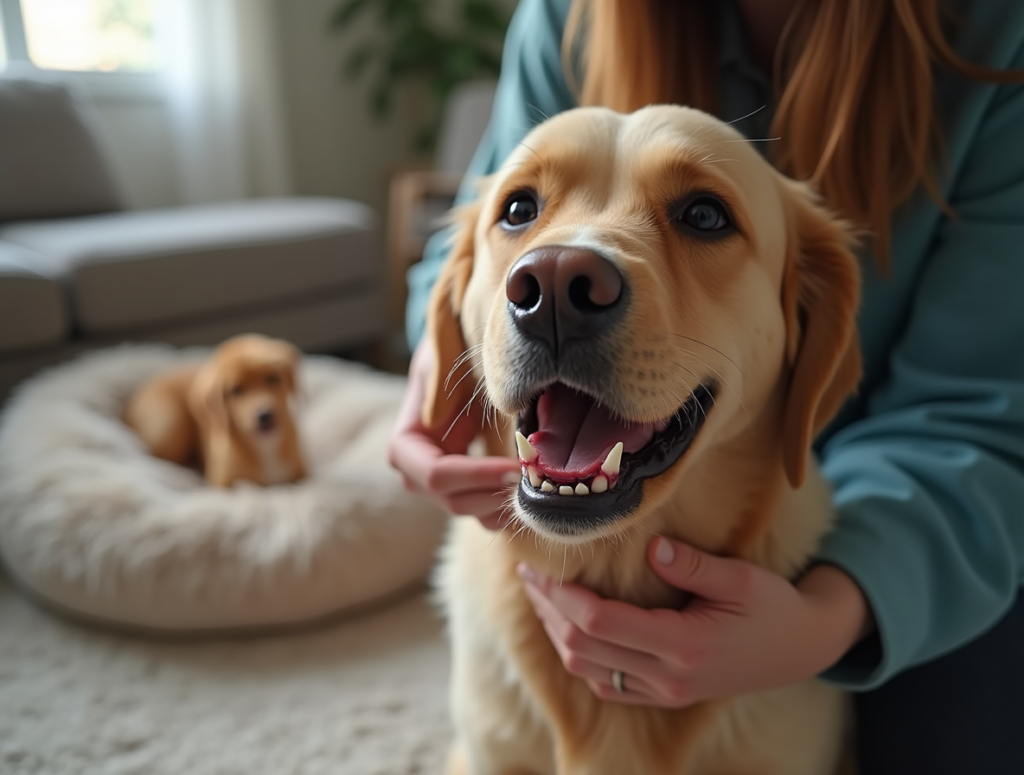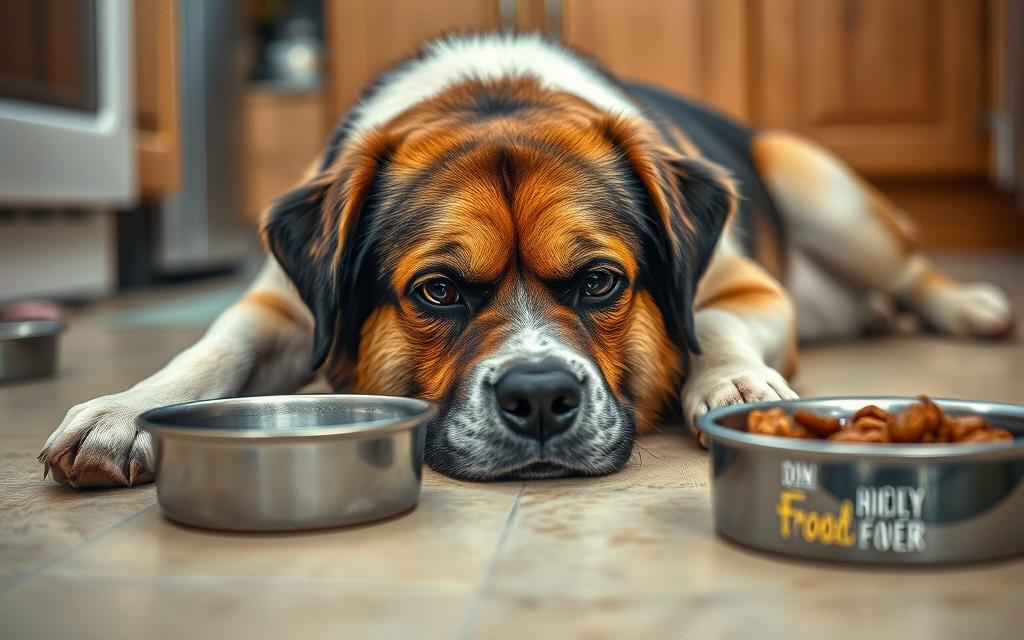It’s worrying when your dog suddenly stops eating. Dog not eating can be caused by many factors, including health issues, changes in their environment, or stress. Understanding why your dog isn’t eating is the first step toward helping them feel better.
Dogs typically love food, so when your dog is not eating, it can indicate a health problem. It might be something as simple as a dental issue, or a change in their environment. Identifying the cause and addressing it quickly is essential for getting your dog back to eating properly.
In this article, we’ll explore the common reasons why a dog not eating could occur, the signs to watch for, and how to encourage your dog to eat again. With the right approach and veterinary care, you can keep your dog healthy and happy
Table of Contents
Key Takeaways
- Loss of appetite in dogs can be caused by a variety of medical and behavioral factors.
- It’s important to identify the underlying reason behind your dog’s lack of appetite to address the issue effectively.
- Prompt attention and appropriate interventions can help restore your dog’s appetite and prevent further health complications.
- Consulting with a veterinarian is crucial to ensure your dog’s well-being and rule out any serious medical conditions.
- Implementing safe and effective strategies to stimulate your dog’s appetite can help get them back on track with their regular eating habits.
Understanding Normal vs. Abnormal Loss of Appetite in Dogs
Dogs’ appetites can change from day to day. But, a big or lasting drop in appetite is a worry. Knowing the difference between normal and abnormal changes is key to keeping your dog healthy.
Signs of Acute vs. Chronic Appetite Loss
Acute appetite loss is when a dog suddenly stops wanting to eat. This can happen due to stress, being sick, or a big change in their routine. Chronic loss, however, means a dog eats less for a long time, which might mean they’re sick.
When Loss of Appetite Becomes a Concern
If your dog is not eating for more than 24-48 hours, or eats much less for a long time, you should act. A dog not wanting to eat can be a sign of a health problem. It’s important not to ignore it.
Impact of Age on Eating Habits
As dogs get older, their eating habits change. Puppies and older dogs might need to eat more often. Adult dogs usually eat at the same times every day. Watching how your dog eats and adjusting their diet can help them stay healthy.
If your dog won’t eat food, it’s best to be careful. If you’re worried about your dog’s appetite or eating, talk to your vet. They can find out why and help fix it.
Most healthy dogs can go without food for 24-48 hours safely. But, if they go longer, you need to see a vet right away. Feeding your dog well and watching their eating can stop serious problems.

| Acute Appetite Loss | Chronic Appetite Loss |
|---|---|
| Sudden, temporary decrease in food intake | Prolonged, consistent reduction in food intake |
| Potentially caused by stress, illness, or routine changes | May indicate an underlying health issue |
| Typically resolves within 24-48 hours | Persists over an extended period |
Medical Reasons Behind Dog Not Eating
If your dog is not eating suddenly, it’s important to look into medical reasons. Dental issues and serious health problems can make them lose interest in food.
Dental Problems and Oral Health Issues
Dental issues like tooth decay or gum disease can hurt your dog’s mouth. This pain might make them not want to eat. If your dog seems uncomfortable eating, take them to the vet for a check-up.

Digestive System Disorders
Dental problems like tooth decay or gum disease can hurt your dog’s mouth, making them less interested in food. Find out more about dental health issues in dogs here. If your dog seems uncomfortable eating, take them to the vet for a check-up.
Serious Medical Conditions to Consider
- Cancer, especially in the digestive tract or mouth
- Kidney or liver disease
- Neurological disorders, such as cognitive dysfunction syndrome
- Endocrine imbalances, like hypothyroidism or diabetes
Severe conditions can cause lethargy, weight loss, and vomiting. If your dog shows these signs, get them to the vet fast.

Understanding why your dog might not want to eat can help. Working with your vet, you can find the cause and help your dog enjoy meals again.
Behavioral and Environmental Factors Affecting Appetite
When your dog won’t eat food or seems less interested, look beyond health problems. Your dog’s eating habits can be influenced by many factors. These include their behavior and the environment around them.
Stress and anxiety can really affect a dog’s appetite. Big changes like moving or getting a new family member can stress them out. Even loud noises or new places can make them less hungry.
- Sudden changes in living environment or routine
- Separation anxiety or other forms of stress
- Perceived threats or unfamiliar surroundings
- Conflict with other pets or family members
What your dog likes to eat can also matter. If you change their food, they might not want to eat. They might also not like certain foods if they’ve had bad experiences with them before.
| Behavioral Factors | Environmental Factors |
|---|---|
| Stress and anxiety | Changes in living environment |
| Food preferences and aversions | Unfamiliar surroundings |
| Conflict with other pets or family members | Disruptions to routine |
Understanding these factors can help you address your dog’s appetite issues. This way, you can help them enjoy meals again.
How to Encourage Your Dog’s Appetite and When to See a Vet
If your dog isn’t eating, there are safe ways to help. But, watch closely and see a vet if it doesn’t get better or if you see bad signs.
Safe Methods to Stimulate Eating
- Offer small, frequent meals of your dog’s favorite foods or a mix of wet and dry food.
- Warm up the food to enhance aroma and flavor, which can entice a dog with a poor appetite.
- Add a small amount of low-sodium broth, plain yogurt, or toppers like cooked vegetables or lean protein.
- Hand-feed your dog or offer food by hand to create a positive association with eating.
- Ensure your dog’s environment is quiet and free from stressors that could suppress their appetite.
Emergency Warning Signs
If your dog doesn’t eat for more than 24-48 hours, or shows signs like vomiting, diarrhea, lethargy, or weight loss, get vet help fast. These could mean a serious health issue that needs quick care.
Veterinary Treatment Options
Your vet might suggest different treatments based on why your dog isn’t eating. This could be changing their diet, giving medicine to help them eat, fixing dental or digestive problems, or treating a serious illness. Your vet will guide you on the best way to help your dog eat well again.
It’s always safer to be careful with your dog’s health. If you’re worried about their eating or overall health, talk to a vet right away.
Conclusion
A dog’s loss of appetite can be a worrying sign that needs quick action. It could be due to health issues, dental problems, or even environmental factors. It’s important to find out why your dog isn’t eating to keep them healthy.
Watching your dog’s eating habits closely is key. If you notice they’re not eating much, try to make food more appealing. But if this doesn’t work, or if you see any emergency signs, see a vet right away.
How much a dog eats can show how healthy they are. By watching their eating and getting help when needed, you can keep your dog happy and healthy. This helps avoid bigger problems related to dog not eating or loss of appetite in dogs.
FAQ
- Why is my dog not eating?
There are many reasons why your dog might not want to eat. Dental problems, digestive issues, and medical conditions are common. Stress and changes in their environment or routine can also play a part. It’s key to watch your dog’s appetite closely and seek help if it drops.
- How long can a dog go without food?
Healthy dogs can usually go 3-5 days without food before it becomes dangerous. But, if your dog stops eating, you should talk to your vet right away. Lack of appetite for too long can cause dehydration, malnutrition, and other serious health issues.
- What are the signs of acute vs. chronic appetite loss in dogs?
Acute appetite loss is when a dog suddenly stops eating for a short time. It often comes with vomiting, diarrhea, or feeling very tired. Chronic loss is when a dog eats less over a long time. Both need attention, but chronic loss might mean a serious health issue.
- How does a dog’s age affect their eating habits?
A dog’s age can change how much they want to eat. Young dogs usually have big appetites. Older dogs might eat less because of dental problems, metabolism changes, or chronic conditions.
- What are some common medical reasons for a dog not eating?
Dental issues, digestive problems, and serious diseases like cancer can make a dog lose their appetite. If your dog isn’t eating, it’s important to get them checked by a vet to find out why.
- How can environmental and behavioral factors impact a dog’s appetite?
Stress, changes in routine, new places, and food preferences can affect a dog’s appetite. Things like moving, new pets, or family members can make a dog not want to eat.
- What are some safe methods to stimulate a dog’s appetite?
Try using tasty, high-value treats, warming their food, and feeding them by hand. Keep their feeding schedule regular and make sure they always have fresh, clean water.
- When should I seek veterinary care for my dog’s lack of appetite?
If your dog hasn’t eaten in 24-48 hours, is vomiting, seems very tired, or shows other signs of illness, see a vet right away. Long-term lack of appetite can lead to serious health problems and needs professional help.

